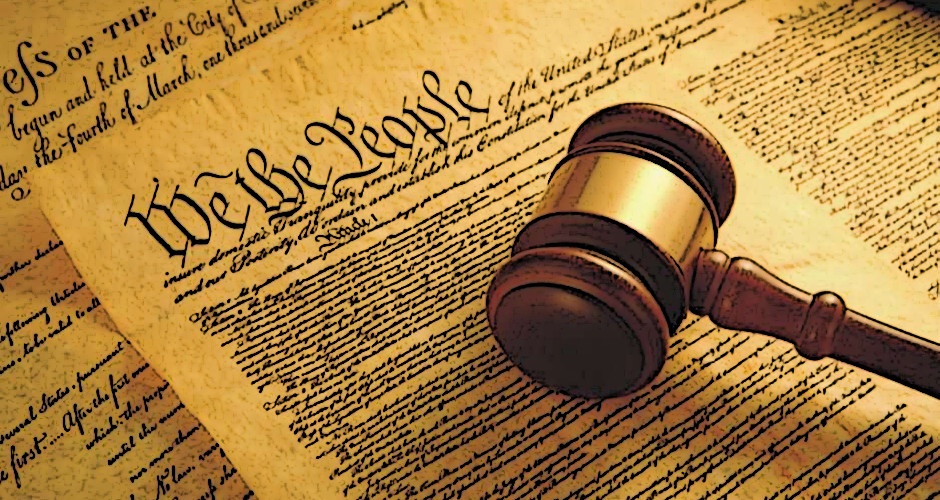Two competing and irreconcilable worldviews are tearing our nation apart and nowhere do the divisions in our society have more serious consequences than the effort by judges, lawyers and legal scholars to define, in our time, the meaning, intent, and limits of the U.S. Constitution.
There are two overriding presuppositions among the political and legal class regarding constitutional interpretation. The first is that values are arrived at by consensus. Meaning and values change over time based on what the community agrees upon. In his book, Constitutional Government in the United States, Woodrow Wilson said, “Living political constitutions must be Darwinian in structure and in practice.” Jack M. Balkin and Reva B. Siegel, contributors to the book, The Constitution in 2020, state, “Their [courts] decisions draw on contemporary values and respond to complex currents in public opinion.”
The second presupposition is that the U.S. Supreme Court is the final arbiter of the meaning and application of the Constitution. In 1787 Article VI established the Constitution as the supreme law of the land. Then in 1803, the U.S. Supreme Court decision in Marbury vs. Madison established the principle of judicial review. Judicial review allows courts to rule on the constitutionality of legislative or executive acts. Given the above, Michael C. Blumm, Law Professor at Lewis and Clark Law School, makes clear that, “…while the Court might not be infallible, its interpretations of the Constitution are binding on the states – and, indeed, the other branches of government.”
If we are to accept current legal understanding, Article VI of the Constitution which contains the so-called Supremacy Clause, binds every political jurisdiction to the Supreme Court’s interpretation of the law. The Article VI Supremacy Clause states:
This Constitution, and the laws of the United States which shall be made in pursuance thereof; and all treaties made, under the authority of the United States, shall be the supreme law of the land; and the judges in every state shall be bound thereby, anything in the Constitution or the laws of any State to the contrary notwithstanding.
But it is clear from the text that federal laws must adhere to the Constitution if they are to be valid. Unconstitutional federal laws are no law at all. There are thousands of federal laws, and regulations that have the force of law that exceed the limited powers granted to the federal government by the Constitution. These laws and regulations, unless challenged, are presumed to be legal and binding.
Was it the intent of the Framers of our republic that the Supreme Court establish itself as an oligarchy? Should the federal judiciary, a part of the federal government, have the authority to define the limits of its own powers? If our republican form of governance with its system of checks and balances is to continue to function, what or who is a check against improper or unlawful constitutional interpretations?
Checking federal overreach must become the responsibility of the states. The states must stand as a barrier between the people and unconstitutional federal laws. This is not a new concept. James Madison, writing in 1798 from Virginia said,
This assembly…declare, that it views the powers of the federal government, as resulting from the compact, to which the states are parties; as limited by the plain sense and intention of the instrument constituting the compact; as no further valid than they are authorized by the grants enumerated in that compact; and that in case of a deliberate, palpable, and dangerous exercise of other powers, not granted by the said compact, the states who are parties thereto, have the right, and are in duty bound, to interpose for arresting the progress of the evil, and for maintaining within their respective limits, the authorities, rights, and liberties appertaining to them.
Madison is affirming the fact that the states, by contract, established the federal government; intentionally limited the authority of the federal government by specifying its powers; and they have the right and duty to “interpose” or stand against unlawful federal statutes and regulations.
In 1799 Thomas Jefferson affirmed the same duty of state interposition:
If those who administer the general government be permitted to transgress the limits fixed by that compact, by a total disregard to the special delegations of power therein contained, annihilation of the state governments and the erection upon their ruins, of a general consolidated government, will be the inevitable consequence.
State interposition is a direct threat to the political/judicial consensus for beneficent, all-powerful, central government. Despite the efforts of a few believers in limited government, the result has been decades of unchallenged court decisions that have expanded central government control far beyond constitutional constraints. Unless the state legislatures begin to stand against the onslaught of federal overreach and refuse to enforce unlawful federal statutes, our republic will be lost and in its place, a “general consolidated government” will arise with self-appointed authority over all our rights and liberties.


